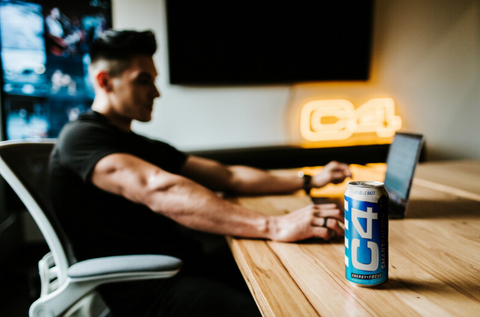By Erick Avila
Feeling unproductive can be a helpless experience like you’re stuck in the mud. Whether its trouble getting started on a big project or finding the right words to finish an important paper, hitting this roadblock can be unpleasant. Fortunately, we’ve put together a list of productivity hacks you can try to help you crush tasks and achieve your goals.

Avoid Decision Fatigue
It’s estimated that an American adult makes 35,000 decisions a day.[1] Decision making can be mentally taxing and interfere with your overall productivity goals. Research shows that decision fatigue can result in decreased cognitive performance, a tendency to avoid challenging problems, and result in people defaulting to heuristic decision-making (taking mental shortcuts). [2,3,4] Because of this, many high performers look for ways to reduce the overall number of decisions they need to make in a day. This enables them to focus their mental firepower on the most important decisions they need to worry about.
Smart Tip: Identify different tasks during your work week that you can automate or prep for on the weekends to reduce the number of decisions you need to make each day. For some people this may mean meal prepping or planning out their outfits for the workweek on the weekends.

Optimize Your Environment
Make your environment more comfortable to increase your productivity. Listening to music can help boost mood, performance on creatively demanding tasks, and the ability to learn. [5,6] A key is finding music that is the right tempo to fit your style, preferably pick music without lyrics.[7] Increasing your “nature contact” can also help boost productivity, creativity, and reduce stress levels. [8,9,10] Nature contact includes things like access to indoor plants, views of the outdoors, natural lighting, and fish tanks.
Smart Tip: Create an environment in your workspace that helps you feel productive by playing music that helps you focus. Decorate your workspace with elements from nature that relax your mood.

Set Focus Blocks
Set aside blocks of time where you can give your undivided attention to your most important tasks. As little as 30 minutes of focus time a day can contribute to your overall productivity.[11] These dedicated focus blocks can be helpful for reducing the burden of “restart cost”. Restart cost is the time and mental effort required to get back into a specific task. Think of a time when you were zoned in on a project and stopped to answer some emails, it probably wasn’t easy to get back into your zone after you finished clearing out your email mailbox.
When we do multiple tasks at the same time or switch between tasks our performance quality and efficiency suffer.[12] Individuals who multi-task tend to perform worse on cognitive control tasks.[13] And research shows that as we perform successive cognitively demanding tasks, our vigilance tends to decline, and we take longer to perform successive tasks.[14] Research also shows that our circadian rhythm can impact the time of day when we perform at our best. Most people’s attention levels are at their lowest during the nighttime and early morning hours. [15,16]
Smart Tip: Create dedicated focus blocks, ideally during the times of the day when you feel most alert and productive. Have a written plan of action of what items you’d like to accomplish during your focus blocks.[17]

Find Time to Decompress
While it may sound counterintuitive to talk about resting in a blog about productivity, finding time to decompress can boost your productivity. Research shows that work output doesn’t increase linearly after a certain threshold has been reached and a lack of rest days can actually decrease output.[18] After a certain point, the quality of our work starts to decrease. Cognitive psychologists note that there is a “spacing effect” where people retain information better in the form of regular spaced-out intervals compared to all at once.[19] This is why people tend to have more success in a class where they’ve studied over the course of an entire semester rather than just crammed during the final days before an exam. Research shows that participating in undemanding tasks during an incubation period can improve performance on previously encountered problems.[20] An example of this that you may have heard of is the eureka moments some people get in the shower or during a run.
Smart Tip: Be sure to include blocks of time in your schedule where you can decompress and give your brain a rest so that it’s refreshed when it’s time to come back to challenging problems. Whether it’s exercise, naps, or meditation, find activities that help you feel refreshed.

Get A Nootropic Boost
Nootropics are ingredients that help support increased cognitive functions like alertness, attention, and memory. Using nootropic supplements is a popular strategy for many high performers when they’re looking to zone in and increase their productivity.
Two ingredients that are commonly used for their brain effects are caffeine and citicoline. Caffeine supplementation can enhance cognitive functions like reaction time, attention, and vigilance. [21,22] We use a plant-based source of caffeine in Smart Energy in the form of InnovaTea®. While citicoline supplementation can enhance focus and attention. [23,24] We use Cognizin® the patented form of citicoline that’s been featured in many clinical trials in Smart Energy.

Smart Tip: Crack open a can of C4 Smart Energy when you need to dial in and focus on a big task.
References
[1] https://www.ncbi.nlm.nih.gov/pmc/articles/PMC6119549
[2] https://www.ncbi.nlm.nih.gov/pmc/articles/PMC7384807/
[3] https://www.ncbi.nlm.nih.gov/pmc/articles/PMC6851887/
[4] https://www.ncbi.nlm.nih.gov/pmc/articles/PMC7384807/
[5] http://graphics8.nytimes.com/packages/pdf/business/LESIUKarticle2005.pdf
[6] https://www.ncbi.nlm.nih.gov/pmc/articles/PMC5671572/
[7] https://content.iospress.com/articles/work/wor01410
[8] https://www.ncbi.nlm.nih.gov/pmc/articles/PMC4276610/
[9] https://www.ncbi.nlm.nih.gov/pmc/articles/PMC3072911/
[10] https://onlinelibrary.wiley.com/doi/10.1111/ina.12593
[11] https://www.ncbi.nlm.nih.gov/pmc/articles/PMC6171789/
[12] https://www.nature.com/articles/d41586-021-00606-x
[13] https://journals.plos.org/plosone/article?id=10.1371/journal.pone.0106698
[14] https://www.frontiersin.org/articles/10.3389/fpsyg.2018.01504/full
[15] https://www.ncbi.nlm.nih.gov/pmc/articles/PMC6430172/
[16] https://www.tandfonline.com/doi/abs/10.1080/02643290701754158?journalCode=pcgn20
[17] https://www.ncbi.nlm.nih.gov/pmc/articles/PMC4763375/
[18] https://journals.plos.org/ploscompbiol/article?id=10.1371/journal.pcbi.1009124
[19] https://journals.plos.org/ploscompbiol/article?id=10.1371/journal.pcbi.1002631
[20] https://journals.sagepub.com/doi/abs/10.1177/0956797612446024
[21] https://www.sciencedirect.com/science/article/pii/S0149763416300690?via%3Dihub
[22] https://www.ncbi.nlm.nih.gov/pmc/articles/PMC4432086/
[24] https://cognizin.com/storage/app/media/pdfs/improve-attention-cognizin.pdf





